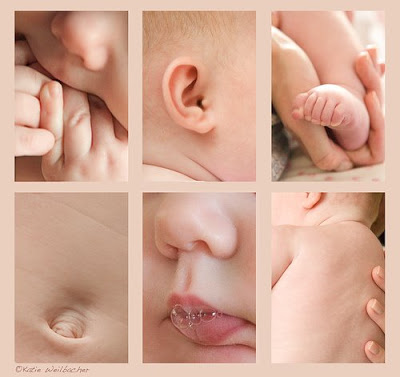
Newborn-Senses
Babies are born fully equipped with all the necessary senses of sight, hearing, smell, taste, and touch. However, some of these senses are less precise than others. Below are some aspects of newborn senses:
- Vision. A newborn’s eyes are a little more than half the size of an adult’s eyes. They grow the most in the first year, then slowly grow until puberty. Over the first few months, babies may have uncoordinated eye movements and may even appear cross-eyed. Babies are born with the ability to focus only at close range–about 8 to 10 inches or the distance between a mother’s face to the baby in her arms. Babies are able to follow or track an object in the first few weeks. Focus improves over the first 2 to 3 years of life to a normal 20/20 vision. Newborns can detect light and dark but cannot see all colors. This is why many baby books and infant stimulation toys have distinct black and white patterns.
- Hearing. During pregnancy many mothers find that the baby may kick or jump in response to loud noises and quiet with soft, soothing music. Hearing is fully developed in newborns. Babies with normal hearing should startle in response to loud sounds, pay quiet attention to the mother’s voice, and briefly stop moving when sound at a conversational level is begun. Newborns seem to prefer a higher-pitched voice (the mother’s) to a low sounding voice (males). They also have the ability to tune out loud noises after hearing them several times. It is estimated that serious hearing loss occurs in about 2 to 3 of every 1,000 newborns. Without screening or testing, hearing loss may not be noticed until the baby is more than 1 year old. If hearing loss is not detected until later years, there will not be stimulation of the brain’s hearing centers. This can affect the maturation and development of hearing, and can delay speech and language. Social and emotional development and success in school may also be affected. It is now recommended that all newborns be screened for hearing loss before leaving the hospital.
- Taste. Taste buds begin forming early in fetal development. It is known that babies prefer sweet tastes over sour or bitter tastes. Babies also show a strong preference for breast milk and breastfeeding, especially if they are breastfed and then offered formula or a bottle.
- Smell. The brain’s olfactory (smell) center forms very early in fetal development. Studies have found that newborns have a keen sense of smell. Within the first few days they will show a preference for the smell of their own mother, especially to her breast milk.
- Touch. Throughout the last months of pregnancy, a baby is snugly cocooned in the uterus, with arms and legs tucked. At birth, babies are thrust into a bright, cold world, where their arms and legs can suddenly move freely. This new freedom can make babies frantic and they may flail and thrash about. Placing a hand on the baby’s abdomen, or cuddling close can help a baby feel more secure. Swaddling (wrapping snugly in a blanket) is another technique for babies who need to feel tucked and secure. Some mothers find their babies are comforted when “worn” in a sling or carrier. This may be helpful for colicky or high-need babies. Holding a baby for feedings is also important. Breastfeeding ensures that a baby spends several hours in mother’s arms.
NEW WORDS & QUIZLET: https://quizlet.com/_4u7vks
Xem lại phần 1: English for IBLCE Preparation 7: Normal Newborn Behaviors and Activities P1

Để lại một phản hồi Hủy